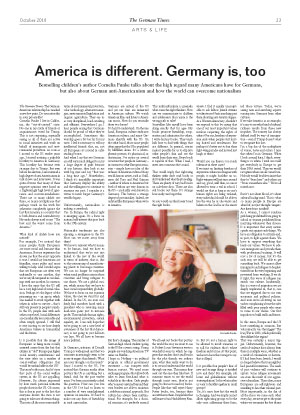America is different. Germany is, too
Cornelia Funke talks about the high regard many Americans have for Germans, but also about German anti-Americanism and how the world can overcome nationalism.
The German Times: The German- American relationship has reached a new low point. Do you notice this in your private life?
Cornelia Funke: I live in California, the “out-of-control” state. No one in my circle of friends or acquaintances voted for Trump. This is not surprising, especially seeing as all of them are active in social initiatives and work on behalf of immigrants and environmental protection. As soon as I moved to the US twelve years ago, I started noticing a palpable hostility to America in Germany. This hostility has become even stronger due to Trump. But even before his election, I encountered a high degree of anti-Americanism in talk shows and interviews. It was quite obvious that many of these negative opinions were based on a frighteningly high level of ignorance and narrow-mindedness. There are so many clichés out there, so many catchphrases that perhaps touch on the truth but otherwise completely ignore the fact that America is a country that is both diverse and contradictory. My uncle always used to say: “The best and the worst come from America.”
What kind of clichés have you noticed?
For example, I’ve noticed that many people think Europeans are more social and humane than Americans. But my experience has shown me that the exact opposite is true. I would say Americans are friendlier, more polite and more willing to help. And I would argue that we Europeans are often very unfriendly to one another, that we’re very ill-tempered in our dealings with one another. In contrast, I have the sense that the US still has a very high level of social cohesion. Perhaps it’s the legacy of the pioneering era – an age in which one needed to work together with others in order to survive – that’s still very present in people’s minds. In the US, people deal with each other at eye level. Social differences are considerably less noticeable and often simply ignored. I still find it very moving to see how deeply Americans believe in humankind and the future.
Is it possible that the image of Europeans as being more socially oriented comes from the fact that citizens in “old” Europe pay higher social security contributions and the state takes on a number of social-welfare obligations that would be unthinkable in the US?
That may be the case. And it’s true that parts of the social welfare system in the US are appalling. However, I’m always impressed by how much personal initiative people show in the US. Of course, this is due in part to the fact that everyone knows the state is not going to take care of certain things. This puts all the more responsibility on rich people to contribute, and this pressure is handled in a much more aggressive way than in Germany. For example, I very quickly got used to being asked to make donations, even on my private phone.
Do you see anything positive in the German social welfare state?
Absolutely! Germany also has an unbelievably positive image among Americans. There’s no need for me to do any publicity for Germany in America. On the contrary, I don’t think I’ve ever been so appreciated by others simply because of where I come from. Americans see Germany as being exemplary in terms of environmental protection, solar technology, alternative energies, environmental legislation and organic agriculture. They see us as very disciplined, hard-working and efficient. Everywhere I go, I hear people saying that Germans should be proud of what they’ve accomplished. Sometimes this worship goes a bit too far for my taste. I feel it necessary to tell my intellectual friends that, no, not all Europeans sit around in cafés reading Proust.
And when I say that we Germans are still very much obliged to carry a large degree of guilt because of our history, they look at me with big eyes and say “that was a long time ago.” Nonetheless, I think it’s incredibly important that Germany display the ability and the willingness to continue to examine our past. I consider it a virtue to never forget Germany’s terrible legacy.
Unfortunately, nationalism is making a comeback.
Yes. In Europe, the radical right is emerging again. It’s a focus on national self-interest that goes back to the 19th century.
Nationalist tendencies are also enjoying a resurgence in the US. How can we move away from them?
We have to reinvent what it means to be human. And we have to understand that we’re not just linked to the rest of the world in terms of industry, that is, due to the outsourcing of manufacturing plants to low-wage countries. We can no longer be surprised when social problems arise in those countries and bring refugees to our shores. We are a global society, which means that we have to bear social responsibility globally. We have to focus on our common values, the ones we stand for and defend. In the US, we now suddenly find ourselves faced with a president who is reversing many hard-won gains just to increase profit. These include human rights, environmental protection, sexual equality, etc. I can only hope that we’re going to see a new level of awareness of the fact that democracy is not going to just fall into our laps. We all have to become more political.
In Germany, criticism of Donald Trump is widespread and the two countries increasingly seem to be more strangers than friends. What are your thoughts on this trend?
Since I moved to the US, I’ve noticed that German media often portray the US as anything but a friend. And for the past twelve years I’ve been consistently asked the question: How can you live in the US? I’ve had to listen to a number of very unenlightened opinions on America. It’s hard to make out any form of friendship in such approaches.
Things look different from the US perspective, however. Americans see European countries as their natural friends and allies, even if Trump is currently trying to undo these bonds. We shouldn’t forget he’s doing the same thing with the rest of the world as well. Every once in a while, I have guests who have very anti-American attitudes, which is difficult for me, because I live here and love the country. Inevitably, after about two weeks, these people start asking how they can get a green card. Fortunately, one learns quite quickly that America is multifaceted and that stereotypes simply don’t do justice to the country.
Germans are critical of the US and yet our lives are immersed in American culture. We watch American films and listen to American music. How do you reconcile these two forces?
It’s hard to understand. On the one hand, European culture embraces American culture, and many Germans identify with the US. On the other hand, those same people often argue that the US is populated by hillbillies alone. It’s a schizophrenic posture, it’s pharisaical, or doctrinaire. I’ve notice on several occasions that people in Germany – in contrast to other European countries – simply have no idea of the richness of American culture. Many world-famous artists, such as Guillermo del Toro and Neil Gaiman – neither of whom is American but both of whom are very famous in the US – are hardly even known in Germany. This betrays a strange degree of provinciality. Indeed, we only feel like Europeans when we’re in America.
But that’s changing. The number of German high school students going to the US for a year is rising. Young people are watching American TV series on Netflix…
I hope so. Nothing – no political program or official government statement – can compete with human contact. We need more exchange programs that allow both sides to learn first-hand what is valuable in the other. Only people who’ve never ventured beyond their own borders are able to maintain a stubborn national approach. But culture has always been multinational. For example, for a classical musician, it’s perfectly normal to work with musicians from all over the world. In fact, it’s almost impossible to sell artists any form of nationalism as a fixed identity.
Furthermore, when I attend, say, a literary festival in Sydney, I don’t limit myself to the German stands. Instead, I venture out and speak to other authors as peers, no matter where they come from. Plus, my readers come from all over the world. Business is also fully international these days, and nationalism simply no longer plays the role right-wing forces would like it to. We’re seeing the reemergence of an old order, like a monster out of the sea. But we all know the future will be multinational and multicultural.
This multiculturalism is precisely what scares far-right thinkers. How can we communicate to children and adolescents that racism is the wrong path to take?
Storytellers like myself have been doing exactly that for ages. My books promote friendship, cooperation and admiration for others. I write fantasy books. They teach kids how to deal with things that are different. In general, stories make it possible for us to slip into other people’s skin and see the world from their eyes. Every book is capable of that. When I read, I enter into someone else’s mind.
That would imply that right-wing thinkers either don’t read books or don’t understand what they’re reading.
There are plenty of very bad books on sale these days. There are also evil books out there. It’s strange how easily we forget this.
So you would say they haven’t read the right books.
We all seek out books that portray the world the way we want to see it. Robert Louis Stevenson wrote a wonderful essay in which he suggests that readers don’t read books for the plot threads we authors spin; what they really want to do is to see and understand the world through our eyes. This means they seek out the eyes they like best. If someone wants to see the world through racist eyes, they’re not going to choose to read my books. People like that will reject Harry Potter books, too, because there are witches in them. People like that will want to ban Huckleberry Finn.
It’s become trendy to ban books because they might hurt readers’ feelings, even among the left. What do you think about that?
Populist thinking fed by fear cannot lead to anything good. But I’m torn. On the one hand, I don’t want to ban books. Freedom of expression is a basic human right. What do we do, however, when members of the Ku Klux Klan and right-wing radicals want to take to the streets to express their views? Presumably, we have to allow that. But there have been deaths at demonstrations recently, even in the US. And we cannot expect people whose grandparents were victims of lynchings to tolerate the KKK roaming the streets. I find it equally unacceptable to ask fellow Jewish citizens to tolerate neo-Nazis marching past them shouting anti-Semitic slogans.
As a Western democracy, shouldn’t we respond to this by saying that one of our most important values involves respecting the rights of others? For me, freedom of expression ends when people start inciting hatred and intolerance. But perhaps it’s better not to ban these right-wing parades and instead just laugh at them!
Would you say there is too much tolerance in these cases?
If we insist on limiting freedom of expression where we disagree with people, it might backfire on us. Right-wingers will just turn around and say, good, well then, no one is allowed to wear a veil in school. I would say that as long as no one’s human rights are being violated, every individual should be able to live the way he or she wants and believe in the God he or she wants to. But it’s not a human right to be allowed to insult someone or to call for violence; that’s where freedom ends for me. At that point, we have to have the courage to say: that is illegal.
Is it possible that people’s fear of new and strange things is justified now and then? For example, job losses and globalization without state regulation? Is this what makes us want to huddle together in small groups?
Yes, it’s scary how fast the world is changing. And we simply cannot allow right-wing groups to be the only ones addressing these fears, especially the fears relating to refugees. After World War II, Germany welcomed millions of refugees from the east. If it was possible back then, why is it a problem today?
Those individuals were predominantly German-speaking people, displaced persons and refugees.
This is true, but today’s immigration is giving Germany a major opportunity to get something back that we had before WWII. As a country, our culture was more diverse back then than it is today, plus we were funnier, we had a greater sense of humor and we were more educated. But then we destroyed everything that embodied those virtues. Today, we’re seeing new and enriching aspects coming into Germany from other cultures.
If we take America as an example, it’s easy to see what kind of cultural richness results from these new impulses. The country has always defined itself by way of immigration – even if Trump doesn’t want to recognize this fact.
I’m a big fan of the multiplicity of voices, tastes and colors. I miss that when I’m in Germany. When I look around here, I think, everything is so white. I wish we could get everybody in Europe to get their DNA tested. Then we would recognize where we all come from. Nobody would be able to insist that they’re “from here” and others are “from somewhere else.” We’re all mixed-race.
But it’s not about blood, it’s about cultural background. This is what so many people in Europe are afraid of, not just the right-wingers. Are these fears justified?
As a woman, I cannot condone girls being prohibited from going to school or women prohibited from marrying whomever they choose. It is important that every nation speaks out against such things. We have an obligation to criticize and, in part, to fight against them. We have to support everything that feeds our values. We have to educate immigrants and provide them with professional training. It will cost a lot of money, but it’s the only way we will be able to get something back. We cannot allow immigrants and refugees to be ghettoized from the very beginning and prevented from working. If we do it right, this wave of refugees can enrich our culture. Incidentally, this is a wave of migration we are deeply implicated in, that is, one that we triggered due to our own economic and political policies. And now we’re all sitting on our yachts complaining about the rafts filled with poor people who want to come to our shores. Our first impulse is to build walls and fences.
In this sense, Europe and the US have something in common. But what exactly was the trigger? The Iraq War in 2003, which politically destabilized the region?
That was certainly a major trigger. Unfortunately, however, the seeds of violence have always been there in multiple ways, whether as a result of colonialism or fascism. If I had been born Jewish, I would no longer believe that my neighbor had peaceful intentions. The seeds of past violence will continue to sprout. Some refugee movements are even the result of our aggressive colonialism. These days, many Europeans are self-righteous and unwilling to face their colonial past.
Most importantly, in the din of all the chaos we cause each other every day, we never get to the point where we recognize the key theme we should be facing as humanity, namely climatic disaster. Instead of focusing on our dying planet, we are entirely obsessed with our own daily affairs and power struggles. Later generations will scold us for being so preoccupied with nationalist ideas while our climate collapses around us. And, of course, we continue to believe today that it’s up to us to decide whether our planet continues to exist or not. But it won’t be us destroying the planet. It will be the planet destroying us.
Peter H. Koepf spoke with Cornelia Funke at the launch of “Deutschlandjahr in the USA” on Aug. 25, 2018, in Berlin.
Cornelia Funke
is a bestselling children’s author.




